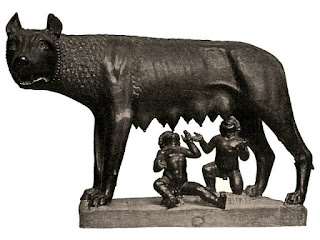According to legend, approximately 2765 years ago, Rome was born! Yes, that's right. Cities can be born. You got a problem with that? (and if you have, you may struggle with the rest of this article)
Almost the big 3-0(-0-0)! I remember the young Rome like it was yesterday. You know the story... two boys, twins, lost and alone. Dumped in a little wicker basket on the river, old mother Tiber, drifting towards destiny. They were raised by a she-wolf, learnt the way of the wolf and lived happy ever after in a Jungle Book/Dances with Wolves kinda way. Actually, err no. It's better than that. According to the legend, the twins were found by a she-wolf, who suckled them and protected them until a Shepherd and his wife took them in and raised them (presumably without the wolf, given their disagreement over lambs). Apparently, when the two boys, Remus and Romolus were adults, they took it upon themselves to found a city (now that's entrepreneurial spirit!)

|
| The Capitoline Wolf. You can see the real thing in Musei Capitolini |
Romulus wished to build the new city on the Palatine Hill but Remus preferred the Aventine Hill. They agreed to determine the site by consulting the omens (or augury, as I believe it is known). Remus was the first to see six vultures flying in the sky. This, as you know, is only a good sign, augur-ily speaking. Soon after Romulus saw twelve vultures. Remus saw the birds first but Romulus saw more. Brothers eh? In the disputes that followed, Remus was murdered by Romulus. According to Ovid Romulus invented the festival of Lemuria to appease Remus' resentful ghost. With his guilt truly sated, Romulus decides to crack on and names the new city Rome, after himself. Naturally.
What with such charm, charisma and the knack for settling a dispute by death, it was only a matter of time before Romulus's little baby Rome starts to attract all kinds of folk. including landless refugees and outlaws, mostly men. Soon after, King Romulus decides that in order for Rome to prosper, they need women! How did Romulus get women? He threw a party! (for Neptunus equestris as it happens) He invites all the local people, including the Sabine tribe from the nearby hills. After they'd all eaten and had a few drinks, on his signal, the Romans grabbed all the women and took them inside the city. This is known as the ratte delle Sabine, or abduction of the Sabine women. Ratte, or raptio in Latin, is where the English word 'Rape' comes from. So, despite the stories of Titus Livius (or Livy, as he's known in English, a Roman historian), I'm guessing it wasn't the best end to a party. Obviously, the Sabine men weren't too happy about this and went off to find their weapons and attack the Romans to get back their women. However, according to Livy (and Wikipedia), Romulus spoke to each of the women in person "and pointed out to them that it was all owing to the pride of their parents in denying the right of intermarriage to their neighbours. They would live in honourable wedlock, and share all their property and civil rights, and--dearest of all to human nature--would be the mothers of free men." Apparently, he also threatened to kill anyone who tried to take them back. Kind of a new spin on the whole 'happy ever after' thing.
And so, the great city of Rome, a city that gave birth to an Empire, gave us roads, aquaducts, sanitation, viniculture and much much more, was born. Given life by a man suckled by a wolf, who stole a load of women from a neighboring tribe and then threatened to kill their parents, and who killed his own twin brother. Italians do like a bit of drama don't they ;)
Sadly, the truth may be more boring. Archeological digs have revealed that the site of Rome has been inhabitied since prehistory, with the first settlement on Capitol hill being founded during the Bronze Age in 1400 B.C. And the she-wolf? Well, some people think that this comes from the Roman slang 'lupa', which, while sounding like latin for a she-wolf, actually means prostitute.
Which story would you prefer to believe? The one about the wolf, or the one about a village slowly getting bigger?
Either way, Rome will be celebrating it's birthday on the 21st April with a series of ceremonies, traditional dancing, gladitorial battles and festivities. The main events will be on the Aventine Hill, between the Capitoline Hill and Testaccio districts. There will also be fireworks display over the Tiber, the best viewpoints for which are the Capitoline hill (also known as Campidoglio) and Giardino degli Aranci, near the Aventine Hill.
The full programme, in Italian, is here.
*Updated 2013.
Whatever the story it always revolves around sex it seems. A tradition kept very well in contemporary Italian politicians & rulers...
ReplyDeleteAny excuse to celebrate.
ReplyDelete